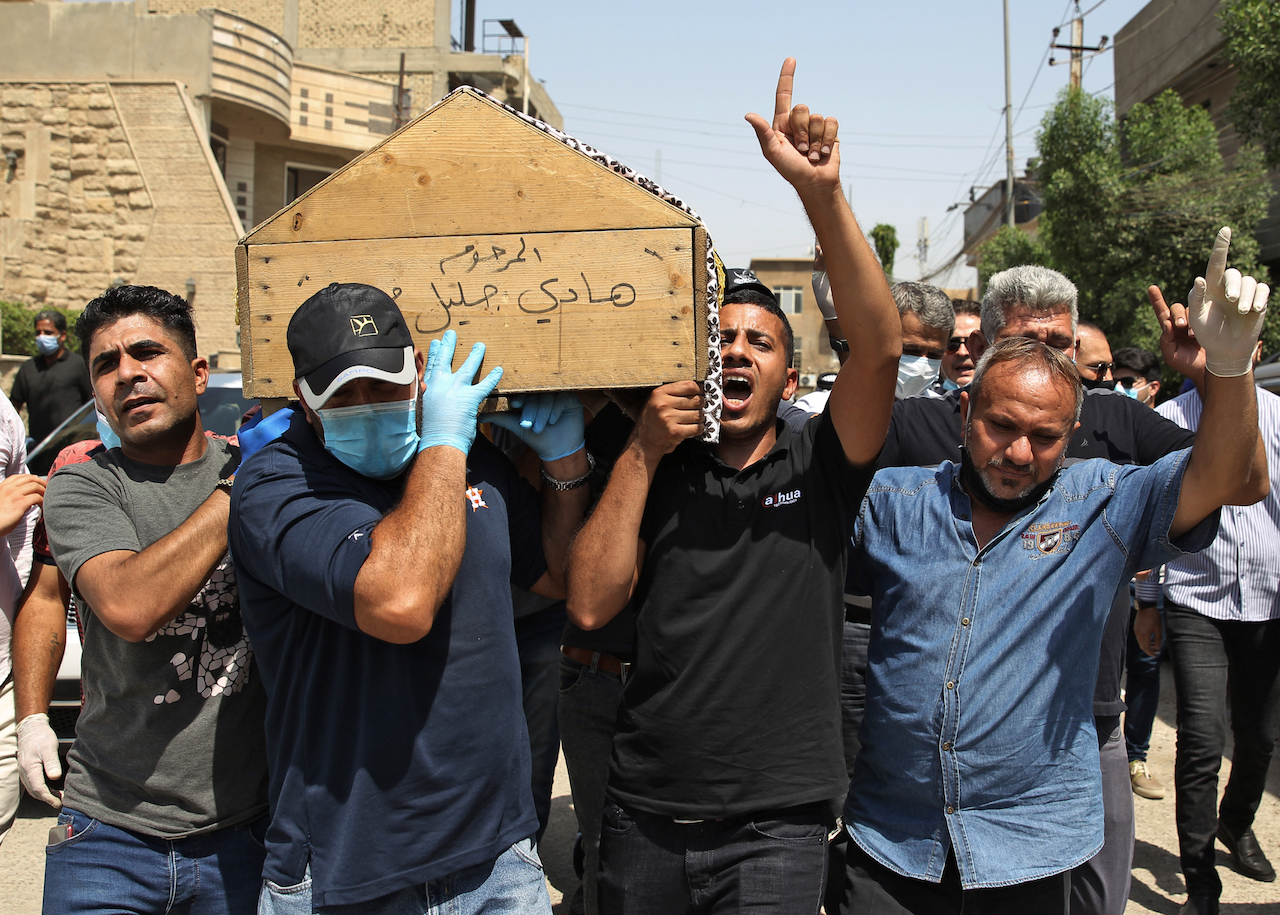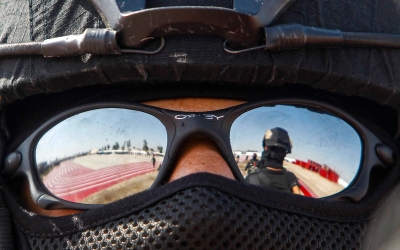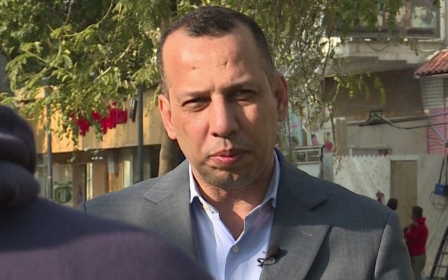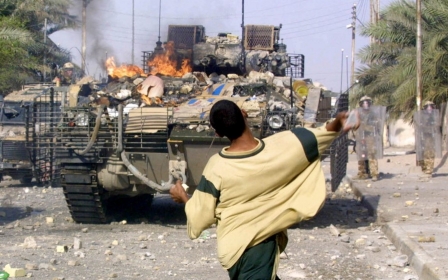'A man of conviction': Grief and fury greet assassination of Iraqi analyst
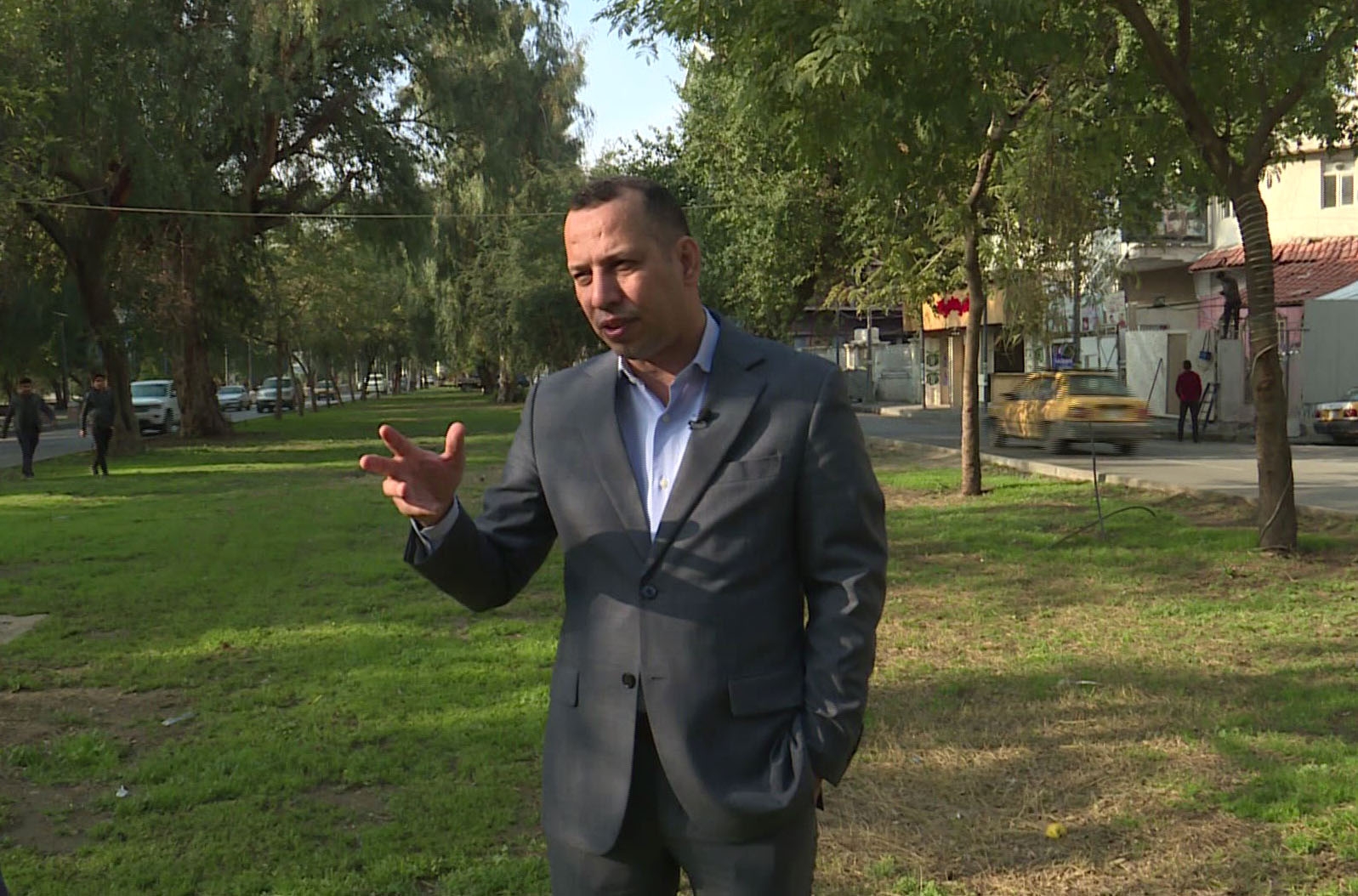
An outpouring of grief and anger has greeted the apparent assassination of the Iraqi analyst and political advisor Hisham al-Hashemi, who was shot dead on Monday evening in Baghdad.
Although no group has officially claimed responsibility, there has been much speculation, and many in Iraq have seen the killing as yet another indication that armed groups can act with impunity in eliminating their opponents in the country.
Video footage released on social media and news outlets appeared to show gunmen waiting outside Hashemi's home in Zayouna, where they launched the ambush.
A vigil was set to take place for the 47-year-old on Tuesday evening in Baghdad's Tahrir Square. A small procession comprised of a few friends and family members carried Hashemi's body at his funeral on Tuesday morning. He was buried in the holy city of Najaf.
The US embassy in Baghdad called on the government to bring "swift justice" over the killing, while the Iranian embassy condemned it as a "criminal act".
New MEE newsletter: Jerusalem Dispatch
Sign up to get the latest insights and analysis on Israel-Palestine, alongside Turkey Unpacked and other MEE newsletters
Iraq's Prime Minister Mustafa al-Kadhimi said he would "not sleep" until the killers of Hashemi were in custody and announced a street in Baghdad would be renamed in his honour.
"Those involved in [spilling] Iraqi blood will face justice, and we will never allow the politics of chaos and the mafia," he told a meeting of his cabinet.
Many journalists, analysts and politicians who worked with Hashemi over the years praised his in-depth knowledge of Iraqi affairs, and particularly the workings of militant groups such as the Islamic State (IS).
Hanar Marouf, another Iraqi analyst who described Hashemi as a "dear friend", said she was still shocked by the incident.
"He was a very dedicated person to his work, an independent person who saw the problems with true loyal Iraqi eyes," she told Middle East Eye.
'He was a very dedicated person to his work, an independent person who saw the problems with true loyal Iraqi eyes'
- Hanar Marouf, analyst
"He knew almost all the political figures and had a very respected professional friendship with them. His loss is a very hard one for Iraq, where a personality like Hisham might very rarely exist again."
Journalist Stephane Kenech, who previously worked with Hashemi in Iraq and Europe, said he was an "essential source of information for many western journalists".
"I have memories of a brilliant man, always smiling - a man of conviction," he told MEE.
Lawk Ghafuri, Iraq correspondent for Kurdish news outlet Rudaw, told MEE he was a "very smart and intelligent man" who had been a keen advocate of Iraq's anti-government protest movement and their concerns.
"He was always telling me to keep giving the voiceless protesters a voice and make their voices to be heard," said Ghafuri.
Death threats
Hashemi had enemies in Iraq, both among Sunni militant organisations such as IS, and the paramilitaries - many backed by Iran - that he often criticised.
Last November, he disappeared from the media for a period after being threatened by the armed group Kataeb Hezbollah (KH), according to the Washington Post.
Since Kadhimi came to power in May, however, he had made more frequent appearances.
'It all begins with the brazen threats they make on public fora such as Facebook and Twitter, then with the act of murder'
- Ruba al-Hassani, analyst
A journalist who had spoken to Hashemi less than two weeks before his death also anonymously told the Alhurra news outlet on Monday that Hashemi had been directly threatened by Kataeb Hezbollah's media spokesperson Abu Ali al-Askari, who allegedly told him: “I will kill you in your house.”
Social media accounts linked to Kataeb Hezbollah appeared to praise the killing of Hashemi on Monday night.
Some circulated a fake screenshot from the IS group's Amaq news agency in which the militant group claimed responsibility for the attack.
Kataeb Hezbollah has been under pressure in recent weeks after Iraq's Counter-Terrorism Service (CTS) launched a raid on one of their bases, arresting 14 members.
The raid came in response to a series of rocket attacks against US interests in the country, which Washington has blamed on the Iran-backed armed group.
Though the operation was the most overt attempt to clamp down on a paramilitary force in Iraq to date, all but one of the detainees were released days later.
"Armed groups are able to reach many people. It all begins with the brazen threats they make on public fora such as Facebook and Twitter, then with the act of murder," said Ruba al-Hassani, a socio-legal academic researcher at Osgoode Hall Law School in Canada.
"The mere fact that they can get away with making public threats means they're confident no government or security official will prevent them from following through with the murder."
Assassinations of politicians and campaigners have been commonplace in Iraq since the 2003 invasion that overthrew Saddam Hussein.
In the last two years, anti-government activists have been particularly targeted, with dozens of often unexplained disappearances and killings taking place in Baghdad, Basra and other cities.
In one of the last articles he wrote before he died, Heshami warned that armed factions possessed "economic, military, media and societal strength that makes [the factions] able to deter everyone who tries to threaten their interests".
He said it would be dangerous if the militias believed Kadhimi's attempted crackdown constituted "a crisis that threatens their survival".
This article is available in French on Middle East Eye French edition.
Middle East Eye delivers independent and unrivalled coverage and analysis of the Middle East, North Africa and beyond. To learn more about republishing this content and the associated fees, please fill out this form. More about MEE can be found here.


